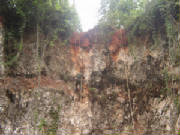|
The Cadet Force came into being on 1st November, 1943, and was then known as the Army and Air Cadet Force. The first Commandant
was Colonel (then Major) Michael Ralph DeCordova, M.B.E., who evolved the organization, rules and regulations and also designed
its badge. At the end of 1943, sixteen (16) Cadet Units were formed in Secondary and Technical schools.
On April 12, 1954, the Force received a great honour. The Mayor and Corporation of Kingston awarded it the Freedom of
the City and its symbolic “Key”. Advantage is occasionally taken of this high privilege and the force
marches through Kingston with fixed bayonets
The JCCF now consists of a moderate headquarters staff and over seventy (70) high schools now have cadet units.
On September 17, 1988 HQ JCCF was relocated at the southern end of Up Park Camp, (de Cordova Barracks, named after its
founder). The official opening was on December 10, 1988 by the then Governor General Sir Florizel Glasspole.
On July 12, 1980, girls in Co-Ed Schools were permitted to join units at their schools.
On the 14th February, 1983, the Force provided a Guard of Honour at The National Stadium on the occasion of the visit
of Her Majesty, Queen Elizabeth II and His Royal Highness, The Duke of Edinburgh.
 |
 |
|

Cadets Rappelling
|
What a job!
Cadet Training embraces programmes to develop Discipline, Leadership and Community Service. The methods of training have
an input of some components of military exercises.
|
|
 |
 |
|
 |
|
Types of Training
Drill:- which facilitates the development of sharp and meaningful responses to orders and underscores respect for authority,
co-operation, unity of purpose and co-ordination of effort.
Map Reading:- knowing and being able to identify physical features of the environment, useful items of information from
this course of study can be of immense value such as Environmental Control, Disaster Preparedness, Watershed Protection, Tourism
such as Roads, Bridle Paths, Identification of Historical Building and Contour of the Terrain etc.
Section Leading:- to enhance leadership capabilities - useful strategies in providing leadership.
Sea Training:- a useful pre-requisite for those who would wish to make navigation a career. The ability to swim and
life guard training could be useful to anyone in civilian life.
Air Training:- a useful pre-requisite for training as an Aircraft Pilot, as Aircraft Crew and Aircraft maintenance. A
highly favoured career path for today youngsters.
Band/Drum Corp:- learning to play musical instrument and being able to offer service through musical rendition at civic
and private functions.
Skill Training:- to provide the youngster with marketable skills as well as pursuing skill training for their personal
development.
Medical Training:- to equip the Cadets with knowledge in basic First Aid.
|
 |
|
|
 |
|
|
|

